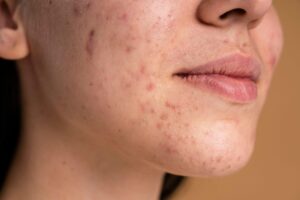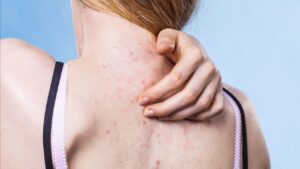Last updated on September 28th, 2024 at 10:54 am
Acne treatment encompasses a range of methods and products designed to address and manage the various factors contributing to acne, a common skin condition. These treatments target causes like excess sebum production, clogged pores, bacterial infection, hormonal imbalances, and inflammation.
The primary goals of acne treatment are to reduce breakouts, alleviate symptoms, prevent scarring, and ultimately achieve clear and healthy skin.
Acne usually develops when hair follicles become blocked due to the accumulation of sebum and dead skin cells. These clogged pores create an ideal environment for bacteria to thrive, leading to inflammation and the development of pimples, blackheads, whiteheads, and sometimes even painful cysts.
Causes for Acne
Acne breakouts result from various factors:
- Excess Sebum: Overactive sebaceous glands produce excess oil, which mixes with dead skin cells, leading to clogged hair follicles and pimples.
- Clogged Pores: When hair follicles or pores become blocked by sebum and dead cells, they create a breeding ground for acne-causing bacteria.
- Bacterial Infection: P. acnes bacteria multiply within clogged pores, causing inflammation and red, swollen pimples.
- Hormonal Changes: Puberty, menstruation, pregnancy, and menopause trigger hormone fluctuations that stimulate sebaceous glands, increasing sebum production and acne risk.
- Diet: While research continues, high-glycemic foods and dairy may worsen acne in some individuals.
- Stress: Stress hormones like cortisol can boost sebum production and weaken the body’s ability to combat acne bacteria.
- Genetics: Family history plays a role in skin type, oil production, and hormonal responses, influencing acne susceptibility.
- Medications: Certain drugs, including corticosteroids, contraceptives, and anticonvulsants, may induce or worsen acne.
- Cosmetic Products: Comedogenic cosmetics and skincare items can block pores, contributing to acne.
- Environmental Factors: Pollution, humidity, and excessive sweating create favourable conditions for acne by clogging pores.
Understanding these causes empowers you to take steps for acne treatment.

Acne Treatment
When treating acne breakouts, the goal is to reduce inflammation, unclog pores, and prevent new blemishes from forming. Here are several typical remedies for acne that can provide assistance:
- Topical Treatments: Over-the-counter creams and gels containing ingredients like benzoyl peroxide, salicylic acid, and alpha hydroxy acids can be effective in reducing mild to moderate acne.
- Prescription Medications: In more severe cases, dermatologists may prescribe topical or oral antibiotics, retinoids, or hormonal therapies to manage acne.
- Lifestyle Modifications: Adopting a skincare routine that includes gentle cleansing and moisturizing, avoiding excessive sun exposure, and maintaining a balanced diet can help prevent and manage acne.
- Chemical Peels: Chemical peels can help improve skin texture and reduce the appearance of acne scars by removing the top layer of damaged skin.
> Consult a doctor and Order Medicine Online
Acne Scar Treatment
One of the most challenging aspects of dealing with acne is the potential for scarring. Acne scars can persist long after the breakouts have cleared, impacting self-esteem and confidence. Fortunately, there are several effective acne scar treatment options available:
- Microneedling: This minimally invasive procedure involves tiny needles that create controlled micro-injuries in the skin, stimulating collagen production and improving the appearance of scars.
- Laser Therapy: Laser treatments can target specific areas of scarring, promoting collagen remodelling and reducing the appearance of scars.
- Chemical Peels: As mentioned earlier, chemical peels can also help with mild to moderate acne scars by exfoliating the top layers of the skin.
- Dermal Fillers: Injectable dermal fillers like hyaluronic acid can temporarily plump depressed acne scars, providing a smoother complexion.
- Surgical Procedures: In some cases, surgical procedures such as punch excisions, subcision, or skin grafting may be recommended for more severe scarring.
Read: What are Generic Medicines?
Back Acne Treatment
Back acne, or “bacne,” can be as distressing as facial acne but is often harder to reach and treat. To tackle back acne effectively, consider these strategies:
- Topical Treatments: Use acne-fighting cleansers and creams specifically formulated for the body, containing ingredients like benzoyl peroxide or salicylic acid.
- Exfoliation: Gently exfoliate your back with a scrub or exfoliating brush to help unclog pores and remove dead skin cells.
- Clean Clothing: Wear loose-fitting clothing made of natural fabrics like cotton to allow your skin to breathe. Avoid tight, synthetic materials that can trap sweat and bacteria.
- Shower After Sweating: If you exercise or sweat heavily, make sure to shower promptly and cleanse your back to prevent sweat and oils from clogging pores.
- Prescription Medications: In severe cases, consult a dermatologist for prescription-strength treatments.

Conclusion:
Acne treatment is not a one-size-fits-all solution, and finding the right approach may require some trial and error. Consult with a dermatologist to develop a personalized treatment plan tailored to your specific needs and skin type. Remember that clear skin is achievable with patience, consistency, and the right combination of treatments.
Advantages of Generic Medicines
Generic medicines offer several advantages. They are more affordable than brand-name drugs, making healthcare more accessible to a broader population. Despite the lower price, generic medications are required to meet the same quality and safety standards as their branded counterparts.
Generics are equally effective and often have the same active ingredients, ensuring that patients receive the same therapeutic benefits. Additionally, the availability of generic options fosters competition in the pharmaceutical industry, which can further drive down drug costs and encourage innovation.
FAQs on Acne Treatment
Q1: What is acne treatment?
Acne treatment involves addressing the underlying causes of acne, such as excess oil production, clogged pores, and bacteria, through various methods, including topical treatments, medications, and lifestyle adjustments. The goal is to reduce breakouts, inflammation, and the risk of scarring to achieve clearer, healthier skin.
Q2: What are the common over-the-counter treatments for acne?
Over-the-counter treatments often include products with ingredients like benzoyl peroxide, salicylic acid, and alpha hydroxy acids. These can help unclog pores, reduce inflammation, and manage mild to moderate acne.
Q3: Can I use natural remedies like tea tree oil for acne treatment?
Yes, natural remedies like tea tree oil may help. It has antibacterial effects that can combat acne-causing bacteria. However, it’s essential to dilute it properly and use it with caution to avoid skin irritation.
Q4: For acne treatment, when should I see a dermatologist?
Consider seeing a dermatologist if your acne is severe, persistent, or causing scarring. They can prescribe stronger medications, perform procedures, and provide personalised guidance for effective acne management.
Related Links:
